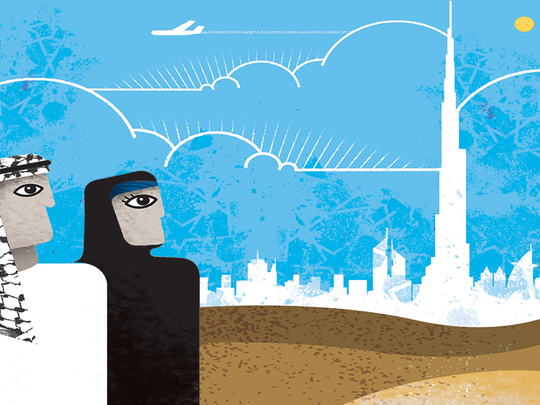
I spent two working days last week in Dubai, this time attending the 15th annual Arab Media Forum (AMF). I have seen this forum grow from infancy to a large gathering attended by hundreds of media persons and people from related industries from almost all over the world. I have taken part in this event from the beginning; year after year it has become more organised. But the surprise came from someone who was attending the forum for the first time.
A well-known female journalist from Lebanon was sitting besides me during the official opening last Tuesday. After a while she looked at me and said, “Look what this man has done for Dubai,” referring to His Highness Shaikh Mohammad Bin Rashid Al Maktoum, Vice-President and Prime Minister of the UAE and Ruler of Dubai, who was arriving at the time to inaugurate the forum.
“Shaikh Mohammad has transformed this place from a desert to an oasis brimming with life and achievements in a very short time. But,” she continued, “we [Lebanon] have thousands of years [of history] behind us, and we deliberately dismantle our country!” No one can disagree that the vision of a leader matters, when one sees the achievements of Dubai. To me, what Dubai and Shaikh Mohammad did most was investing in human capital. Watching Mona Al Marri, the head of Dubai Press Club, speaking without any notes to a large and diverse audience at the formal opening of the forum was a living example of the success of investing in human capital in Dubai and the UAE. She was eloquent, precise and to the point, knowing exactly to whom she was speaking, and what her message was. She was talking to the cream of Arab and international media, and all were taking in the message.
Investing in human capital pays off in various ways. Prior to my arrival in Dubai, I got a Whatsapp message from one of the AMF volunteers, saying she would help me upon arrival, and asking if I had any questions regarding the event. A very human touch, suggesting to participants that they were in safe hands.
The second element of success of AMF was the high level of freedom of thought in Dubai. In fact, the ‘F’ should be written in capital letters for Freedom. In the course of the forum, all issues were discussed in a completely free debate, although some of those issues were relatively sensitive, and highly political. These involved discussions about the sectarian differences we see today in the Arab world, the wars in various places in the region, the necessity of state building, and the various views about the future of the Arab world. All these issues were discussed in a civilised manner. Few places today in the Arab world can provide a platform like this. One stance on the first day of the meeting was very clear and frank — the speech given by Eyad Madani, former minister for information and culture in Saudi Arabia, and currently the secretary general of the Organisation of Islamic Cooperation (OIC), which is the second largest intergovernmental organisation after the United Nations. OIC is the voice of the Muslim world. Madani did not shy away from talking about important issues. He said that Islam was in danger, according to the western media, and that we have to work hard to change this picture. “Our organisation is neither philanthropic nor dogmatic, we are a political organisation, and we used to help [countries] financially with the big projects through our Islamic Bank. That is good. But now we have to help those in need, [those who are] poor and desperate in the Muslim world.”
Amr Mousa, the former secretary general of the Arab League, has not hesitated to criticise the West of for its double standards. “They fought to prevent Iran from having nuclear power, and the same time turned a blind eye towards the Israelis having nuclear power. This is not acceptable to the Arab world,” he declared.
As far as Operation Storm of Resolve in Yemen was concerned, he said it was “a preventive war [against] the intervention of Iran in number of Arab countries, [which is] threatening Arab security”. He criticised official voices coming from Iran saying that Tehran was now in control of four Arab capitals. “They [the Iranians] have crossed the red lines of Arab security”, and have to be deterred, even by force. When the new Arab peace force is created, it should act in the hot spots of the Arab nation, he said. “We Arabs are between ‘aggresive’ policies adopted by Tehran, and ‘soft’ polices adopted by Turkey. We should have our own polices defending our interests,” he noted.
UAE Minister of State for Foreign Affairs Dr Anwar Mohammad Gargash was the last of the speakers at the assembly. He was frank, referring to the prevailing Arab situation as “difficult”. He said that most of the crises in the world were in our region, but we should not stop developmental programmes. He said that the biggest success story in the UAE was not building high-rises, but empowering women. He said that most working women in UAE were now in the middle management posts, and that the UAE did this without fuss or community divisions, despite being a conservative society. He predicted that in the coming decade we will see women in high-level jobs.
As for policies to be pursued, he said that the way out for the Gulf region was through pursuing “a moderate policy, away from radicalism”. He said that we should counter extremism with moderation, and building a modern state, where all citizens are equal under the law.
What I have written were just the highlights of the AMF. What happened there was a lot more, and it surprised even those who attend it regularly.
Mohammad AlRumaihi is a professor of political sociology at Kuwait University. You can follow him on Twitter at www.twitter.com/@rumaihi42









